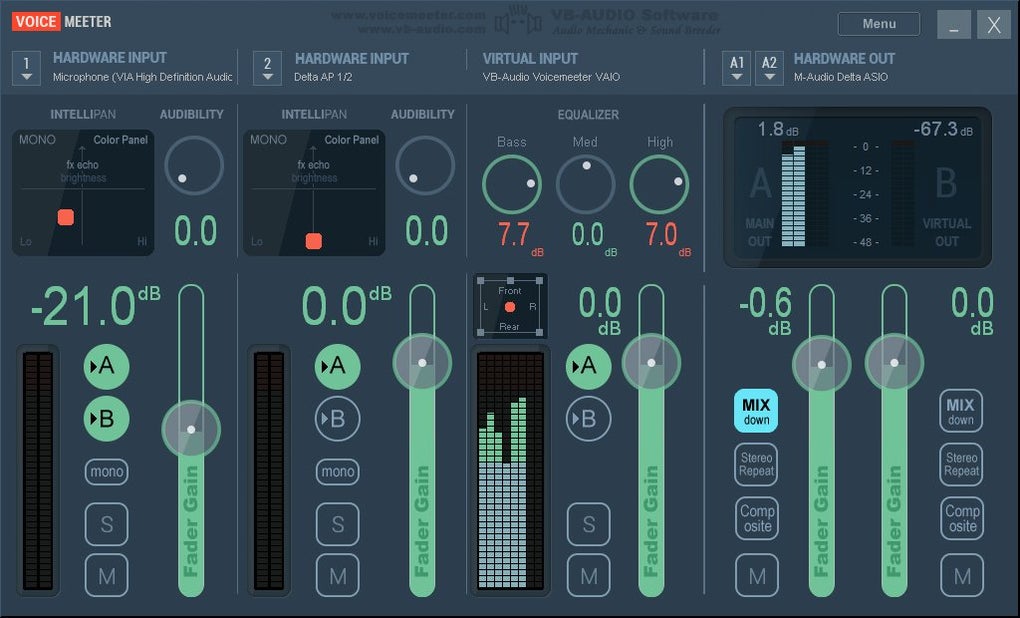
Input echo is where I get the real volume, and again, what I'm hearing doesn't sound like typical phasing. The thing is, I can barely hear myself through the direct monitoring. It's not exactly "phasey" sounding, although you're right, phasing will occur whenever the same signal is replicated and offset, which IS what's happening when I direct monitor and input echo simultaneously. (But in this case I'm not monitoring through any effects.) But the problem I'm trying to describe isn't echo, it's an ugly, metallic sound, as if I've got a bad spring reverb effect on the vocal, or if I'm singing inside of a coffee can. I monitor through effects whenever I track vocals anyway, so a slight delay is actually desirable for me.
Voice meeter echo software#
As I mentioned, when I track at a 64-sample buffer setting, I'm not bothered by the slight latency/echo that exists if I'm monitoring directly through the interface and the software at the same time. I understand what latency is and the difference between input monitoring through an interface/mixer and input echo monitoring through the DAW. Perhaps I should've been a bit more clear. Just disabling the Direct Monitoring OR the Input Echo on the target track will remedy the issue. This does not sound like one of those situations though.

However sometimes with certain routing schemes it simply needs to be tolerated while recording but does not appear on the final track. Muting one or the other will remedy the problem. This is usually measured in milliseconds so instead of an "echo" effect (unless the latency is REALLY bad) it just sounds weird and "phase-ey". You put those two signals together the second signal (from Sonar) will be delayed because it has farther to travel and is being manipulated by more digital crud. Input > Interface > Sonar Track (input/output) > Sonar Main Output > Interface > Headphones/Monitors (this takes a little longer for the signal to return to your ears. Input > Interface > Headphones/Monitors (a direct, unprocessed signal that doesn't go through the DAW/Sonar so the signal hits your ears very quickly) Input Echo from a track in Sonar. Anyway, not a deal breaker since the recorded audio sounds fine, just wondering if I'm off my rocker or not. Of course, maybe I'm just listening for it now. I've set up acoustic guitar stuff before and didn't notice it then. However, when setting up mic placement to record acoustic guitar a few days later, I noticed the same thing. SO, it could very well be that input echo has always had this type of behavior and I only noticed now that I'm just monitoring dry vocals.
Voice meeter echo plus#
This is the first podcast I've recorded, and whenever I've recorded vocals in the past, it has always been with a cue mix going into my headphones in addition to the input echo of my armed vocal tracks, PLUS I typically send the track to a reverb and monitor that as well. The recorded audio sounded just fine so it's just a monitoring thing, but it was really distracting.

When enabling input echo and monitoring through headphones, my voice had this weird splashy effect, almost as if I was sending it to a harsh spring reverb or something. I set my buffer settings to 64 samples whenever I record, so while that obviously introduces a bit of latency/slapback echo, it's barely noticeable.

Voice meeter echo pro#
Although I have direct input monitoring through my interface (Saffire Pro 40), I can't get it to kick up much volume, so I always enable Input Echo on the armed track. So here's something I just noticed recently when recording a podcast.


 0 kommentar(er)
0 kommentar(er)
